AFFILIATE MARKETING
10 Easy Ways To Boost Conversions in 2023

Using ChatGPT for copywriting can help generate creative and engaging content that resonates with your target audience.
Yes, I know you are already good at what you do as an experienced copywriter, but wouldn’t it be great if you always had new ideas? And how about having the superpower of being able to look at your work through the eyes of a practical reviewer?
Read on if you would like a few golden keys to unlocking your full writing potential by using AI technology for copywriting.
You might discover ways to simplify tasks and save yourself time and effort in your copywriting processes!
ChatGPT for Copywriting: Transform your Copywriting
The introduction of artificial intelligence (AI) technology like ChatGPT has revolutionized copywriting. It empowers copywriters to produce more targeted, efficient, and customized content in a shorter space of time.
AI-powered copywriting tools like ChatGPT leverage machine learning algorithms to analyze significant amounts of data. This includes consumer behavior, social media analytics, and market trends. AI copywriters can use this information to write curated AI copy that resonates with their target audience.
Nonetheless, let’s not forget that while using an AI tool can amplify human creativity, it can’t replace it. Excellent copywriting takes a deep understanding of human emotions, something AI can’t do.
10 Ways to Use ChatGPT for Copywriting
If you are a professional copywriter, ChatGPT can streamline your processes.
From helping you find out what your target audience wants to read right through to creating engaging content that ranks in Google, your copywriting techniques can always do with a refresher.
1. Define Your Target Audience
Collect insights and suggestions about your target audience for effective AI copywriting using ChatGPT’s knowledge (or simply using ChatGPT to summarize an article).
Prompt: The product I am marketing is a lip balm made with honey. Define my target audience.
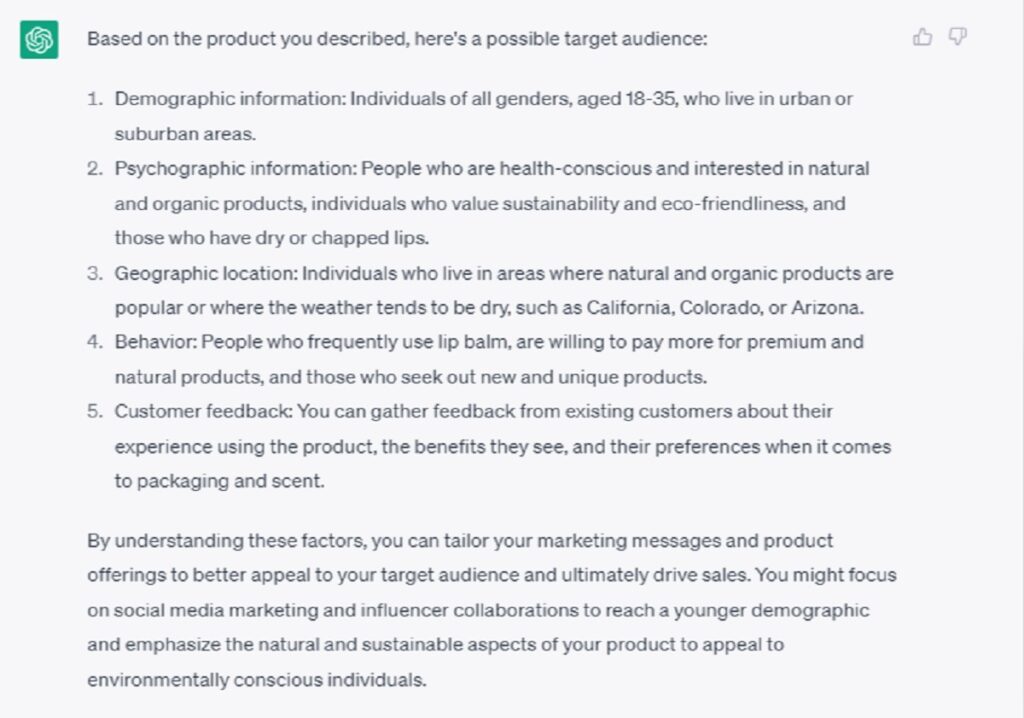
2. Research New Content Ideas
Once you have defined the topic you want to research, you can prompt ChatGPT with a question related to that topic.
Prompt: Topic: sustainable fashion. Give me content ideas.
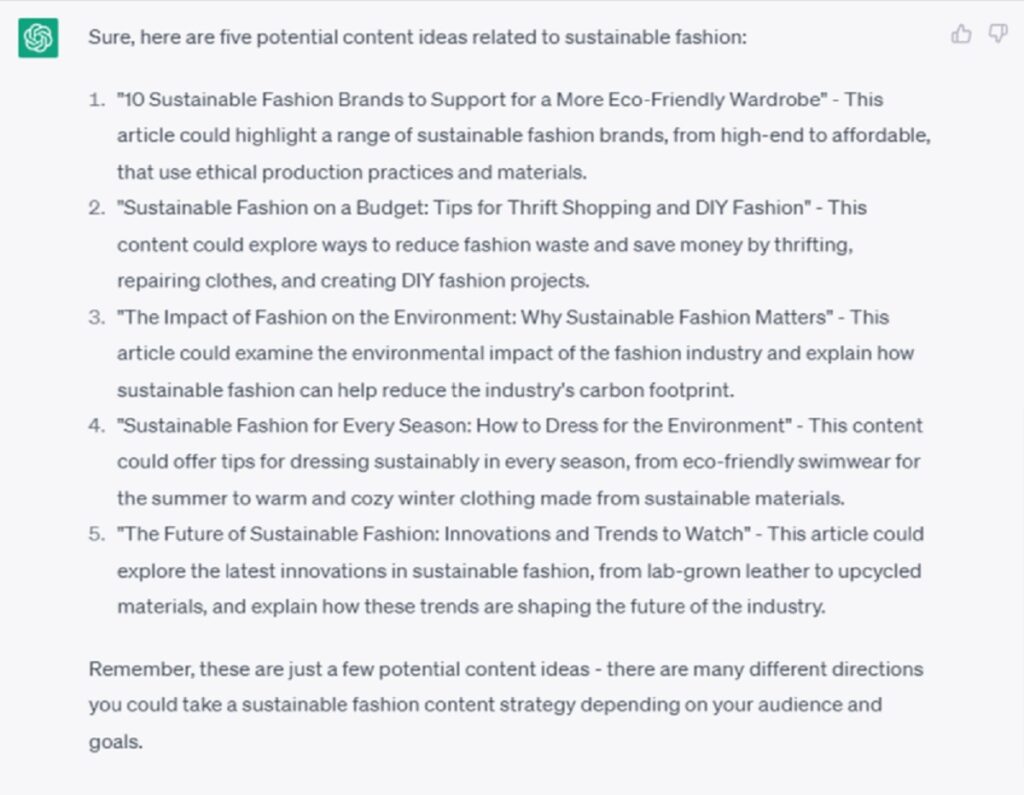
If you want to be more specific, feed ChatGPT detailed information about your audience, brand voice, and marketing goals.
3. Create Outlines for Articles and Blogs
If you are a content writer working on a blog post, ChatGPT can help organize your keyword and new ideas into a structured outline.
Ask ChatGPT to generate an outline for an article using your keyword.
Prompt: Create a basic outline for a 1,500-word article with the keyword: How to Style Blazers.
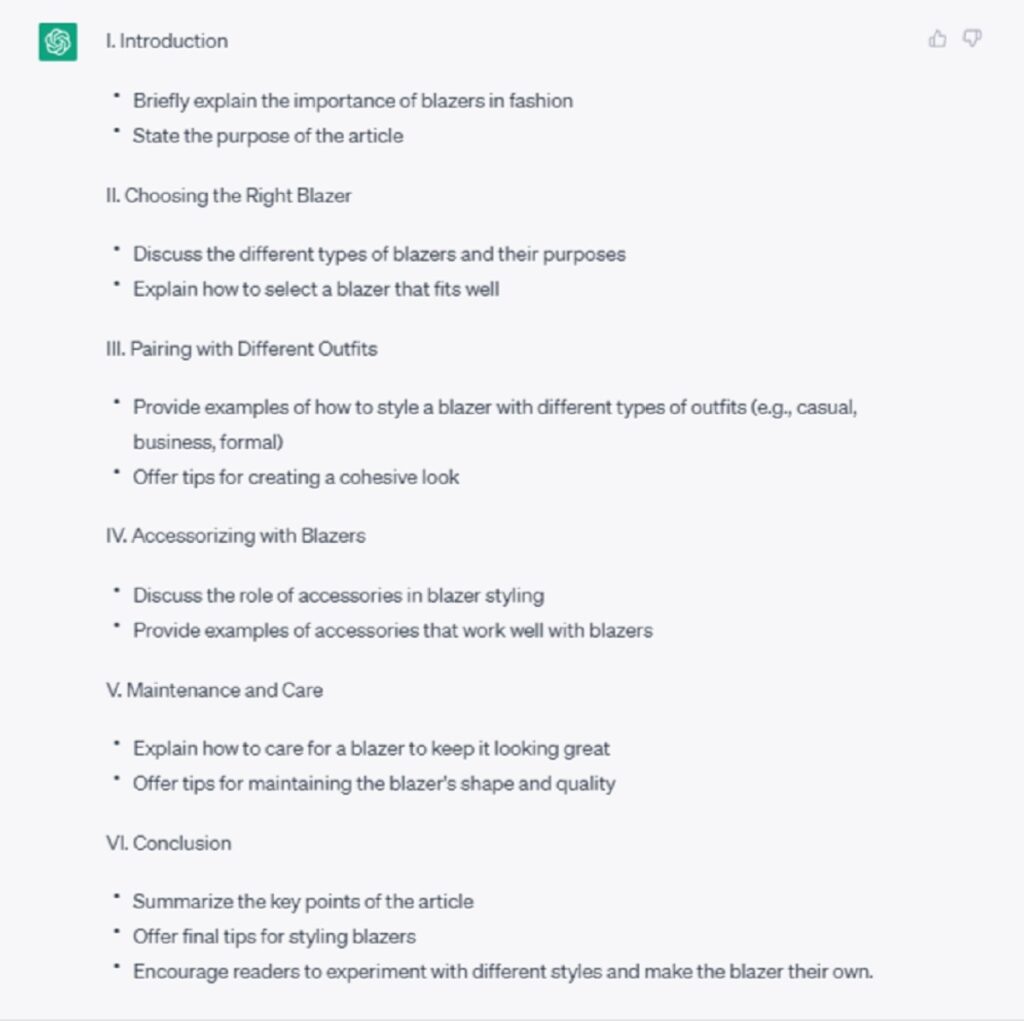
Once ChatGPT has generated a list of subtopics, sections, and ideas based on its knowledge of the topic and related keywords, you can refine it. Personalize the details, remove sections that don’t fit, reorganize the order of subtopics, and add keywords.
Read our article on how to use ChatGPT to write a blog post if you want more detailed instructions.
For more copywriting ideas, read our 10 tips for copywriting for blogs.
4. Write Attention-Grabbing Headlines
We all know that a well-crafted headline can make a big difference in the success of your written content.
ChatGPT will use its natural language processing algorithms to analyze your topic. It will then generate headlines that are most likely to capture the attention of your target audience.
Here are the steps I use to get ChatGPT to deliver the goods:
- Provide ChatGPT with the main keyword, topic, or content idea.
- Ask ChatGPT to create a list of potential titles or headlines using your keyword.
- Review the list and select the one that is most compelling based on brand voice, marketing goals, and target audience.
- Use a headline analyzer like CoSchedule’s Headline Studio to score your headline quality. The tool will rate the headline’s SEO value and its ability to result in social shares.
It’s important to note that while ChatGPT can whip up potential headlines in a jiffy, it’s up to you to choose the most effective one for your content.
Here was how I prompted ChatGPT (this first attempt scored 80 on CoSchedule):
Prompt: Create a high-ranking headline for an article I am writing using the keyword: Baking without an oven.

And for heaven’s sake, make sure your headline reflects what you will write about. A headline that implies something other than what your article is about equals a disappointing user experience.
5. Write Long-Form AI Content
First, determine what you will be writing about, then use a keyword research tool to identify keywords related to your topic.
Start by writing an introduction that gives an overview of the topic, uses keywords, and draws the reader in.
You can then use ChatGPT to generate more content for your article.
Prompt: Here is some text for an article I need long-form copy for:
“Meditation is a popular way to manage stress, improve mental clarity, and enhance overall well-being. In this article, we will explore the science behind meditation, its proven benefits, and how you can get started with your own practice.”
Tell me what some of the scientific benefits of meditation are in no more than 50 words.

Ok, so you want a little more help with your content creation? No problem.
Prompt: Repeat the task, expand the content, and add bullet points.
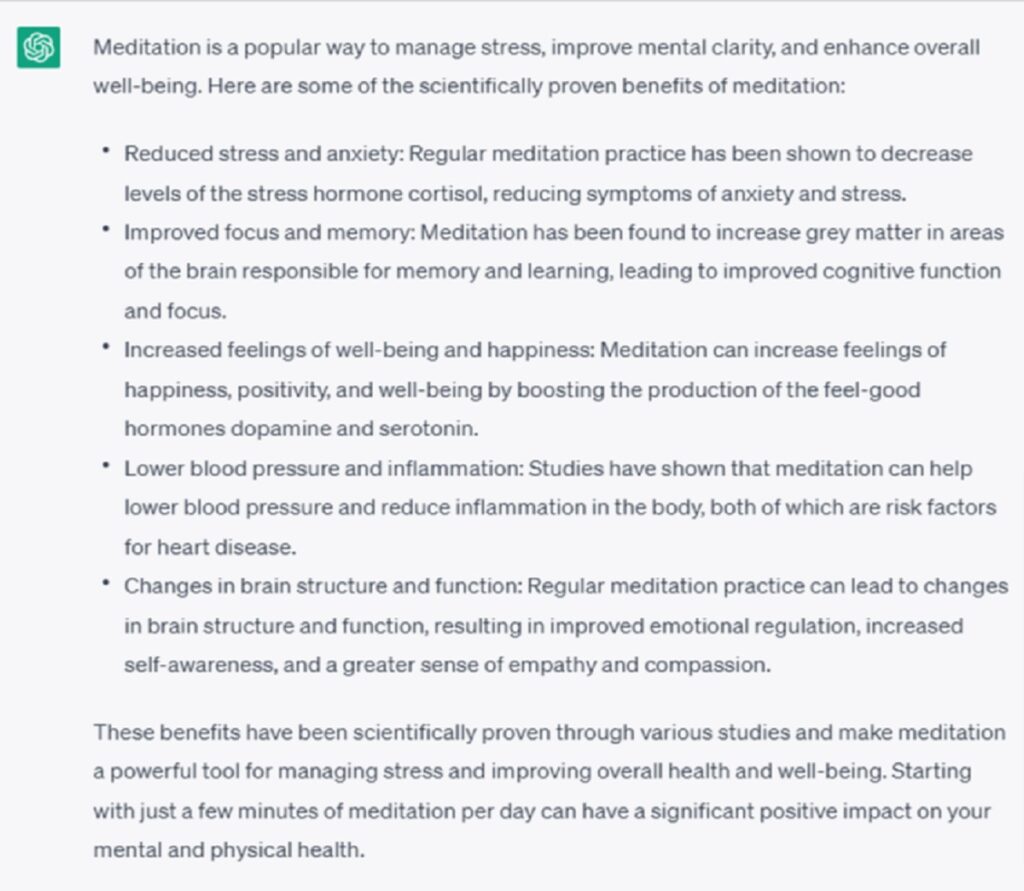
You can keep prompting the AI writing tool until your article has covered everything you want to include and is at the length you want it to be.
6. Create Product Reviews
ChatGPT is a great starting point for product reviews.
You can start by inputting ChatGPT with a list of the product’s key features.
For example, if you are reviewing a smartphone, you can mention camera quality, battery life, design, and software. Give a brief introduction to the product, explaining what it is and does. Now ask ChatGPT to generate the review.
Prompt: Write a short product review for the Galaxy S23 and S23+ highlighting its key features: intelligent battery with excellent battery life, pro-grade camera, powerful processors, vision booster, and Galaxy SIM flexibility.
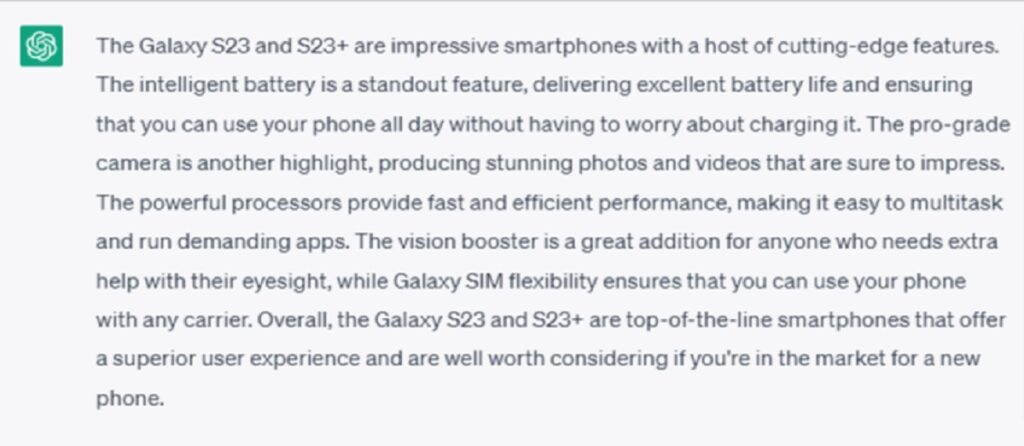
After ChatGPT has generated the product review, you will need to review it and make any necessary edits so that it reads well for potential customers.
7. Write Ad Copy, Emails, and CTAs
ChatGPT is a powerful tool that can help you generate ideas and inspiration for your copywriting. Use it for ad copy, email marketing, and CTAs.
Determine the goal of your copy. You may want to persuade your audience to buy a product, sign up for a service, or visit a website.
Prompt: Give me three options for CTAs directing readers to visit my website after reading my article about chemical-free hand sanitizer.
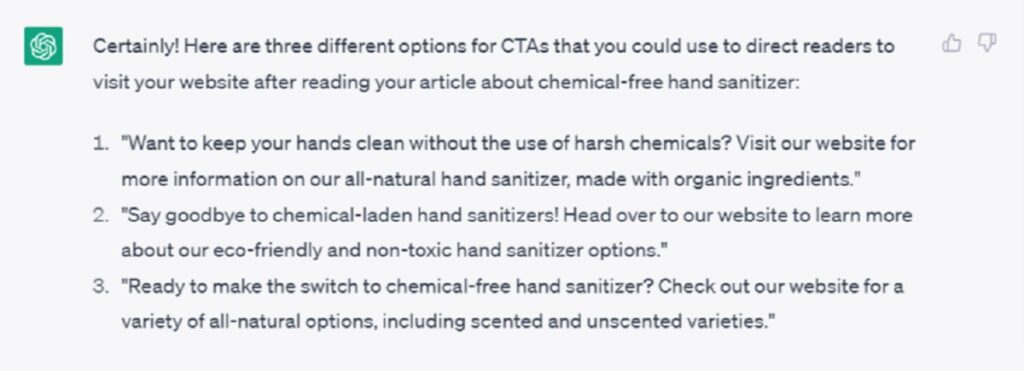
If you would like more ideas, read our post about how to use ChatGPT for social media marketing.
8. Use ChatGPT With Copywriting Frameworks
You can create copy that’s both structured and creative by using ChatGPT with copywriting frameworks like AIDA, PAS, BAB, and more.
Prompt: Write a product description using the “Problem – Agitate – Solve” framework for a new brand of yoga mats.
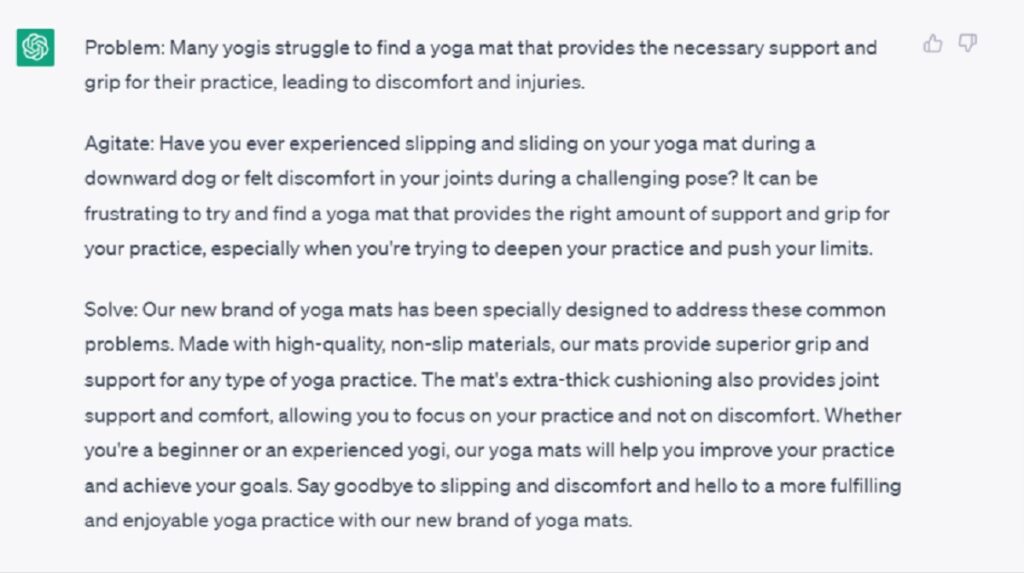
Prompt: Generate a list of product benefits using the “Features-Advantages-Benefits” framework for a new line of sustainable fashion.

9. Summarize and Simplify Lengthy Content
A copywriter needs to make complex information simple and easy to understand. Here are some tips on how to use ChatGPT to summarize and simplify lengthy content:
- Ask it to identify your article’s main points
- Tell it to reorganize your work into bullet points in order of relevance
- Use ChatGPT to cut jargon from your content
- Make it use copywriting frameworks to rework your content
- Get it to cut unnecessary information
10. Review and Fine-Tune Your Content
If you are looking for that “ah-ha-moment” in your copywriting, then use ChatGPT to review and fine-tune your content.
After walking through your article’s good points, the bot will give you practical suggestions to better your work. You can add and remove content to fine-tune your writing this way.
Prompt: Review my content advertising an upcoming food and wine festival with constructive feedback:
It’s that time of year again! The Smallville Food & Wine Festival is a celebration on the 22nd, 23rd, and 24th of May, and you are invited! The three-day community event will take you on a flavorful journey between the Tiny Market behind the Smallville Info Centre and participating restaurants. To give the festival a burst of color, a pop-up art gallery in the hall below the Info Center exhibits the work of local artists. MTB rides are also on the cards, with routes for cyclists of all ages. Live music performances are scheduled every day, so get ready to enjoy great local sounds! The Smallville Food & Wine Festival is all about deliciousness, creativity, and fun! So, mark your calendars and watch this space for more information!
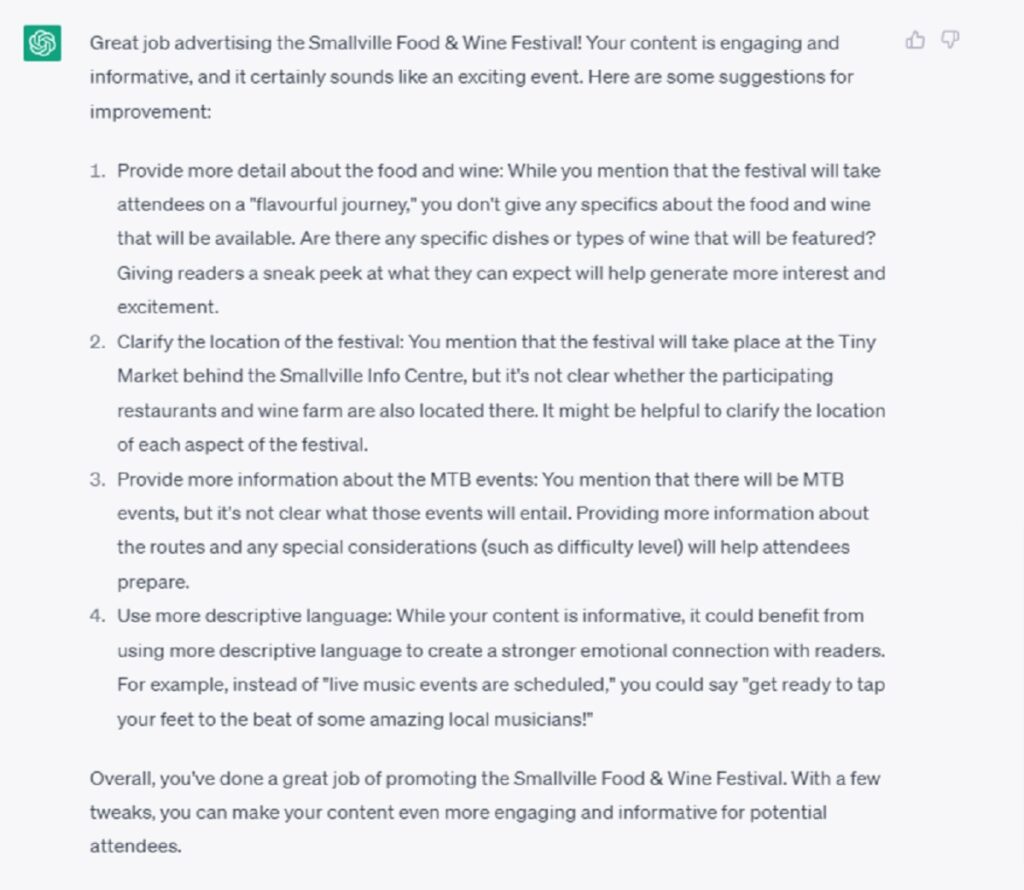
ChatGPT for Copywriting: How To Perfect Your Prompts
Getting ChatGPT to work takes an action sentence known as a prompt.
ChatGPT internalizes your prompt by processing it through a series of algorithms and neural networks trained on a large corpus of text data. The input text is tokenized and processed through multiple layers of the network to generate an output based on the probability of different words and phrases appearing in the context of the prompt.
The resulting response is an intelligent and relevant output that reflects the context and content of the input text.
Start With An Action Word
Always start your prompt with an action word like Write, Give me, Make, Create, and Generate instead of tippy-toeing around with “Can you.”
This is one time when manners fall away, so there is no need to include gratitude in your prompts.
Being assertive will get you the most effective results.
Keep It Simple
ChatGPT must be spoon-fed simple tasks for it to “get you.”
Tell it what you want in short segmented sentences.
Prompt: My client has a guesthouse and is running a winter special. Write three subject lines to maximize their email open rate.
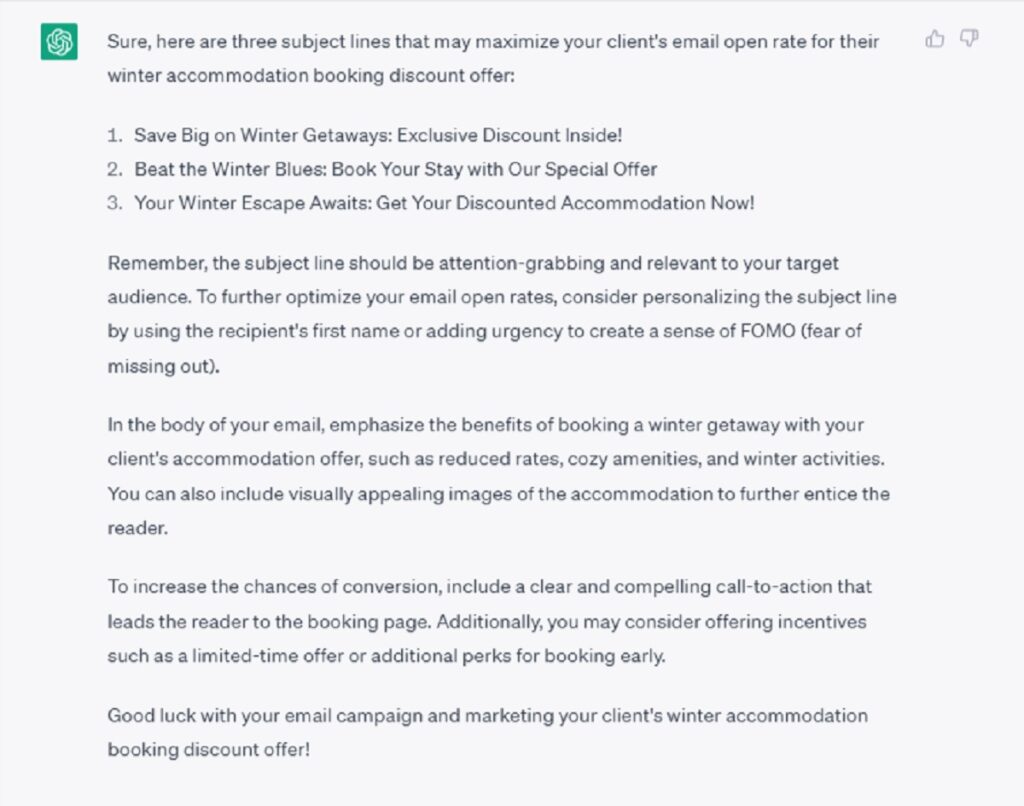
Opt For Your Answers In Tabular Form
Tables can be helpful when dealing with complex data or large amounts of information.
Telling ChatGPT to give you output in tabular format is useful when you have content that you need to compare and organize. By presenting the features of different products side-by-side, your audience can make an informed decision at-a-glance.
Prompt: Arrange the following information in tabular form with comments:
“The differences are stark when comparing the graphics for PS5 vs. PS4. The processing capabilities of the PS5 (36 CU GPU) have double the strength of the PS4 (18 CU GPU). The PS5 also leads the way when it comes to how fast your GPU can process floating-point operations. The PS5 comes has almost nine times more processing power than the PS4, which has only 1.84 teraflops compared to the PS5’s 10.3 teraflops.”
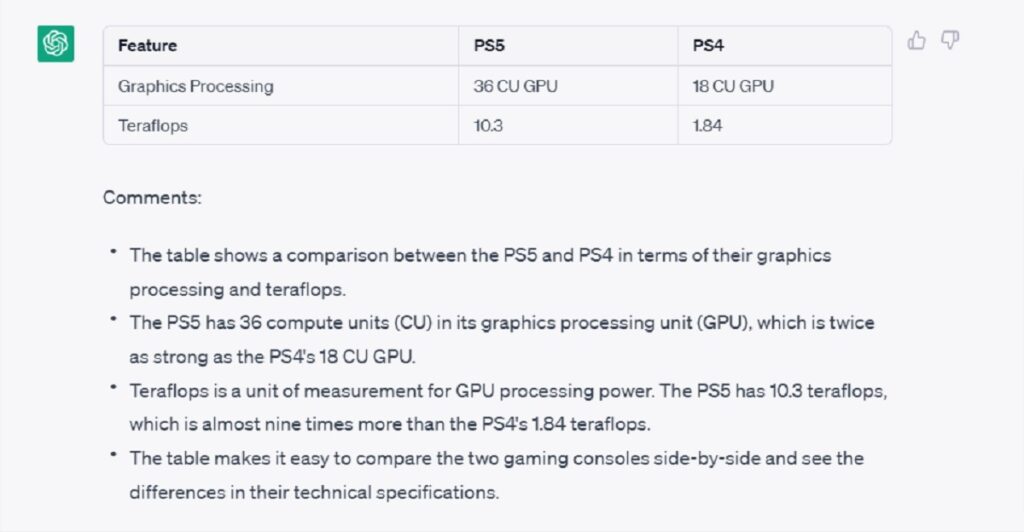
Set Limitations On ChatGPT’s Answers
If you don’t set a cap on its output, ChatGPT can give long-winded responses. It’s important to consider that longer responses may not always be the most useful or informative.
Sometimes, a brief and concise answer can be more effective than a lengthy one. You know what you are looking for, so ask for it!
For example: Instead of saying tell me about bees, ask ChatGPT to answer specific questions.
Prompt: How long does a bee live, and how much honey can one bee produce in its lifetime?
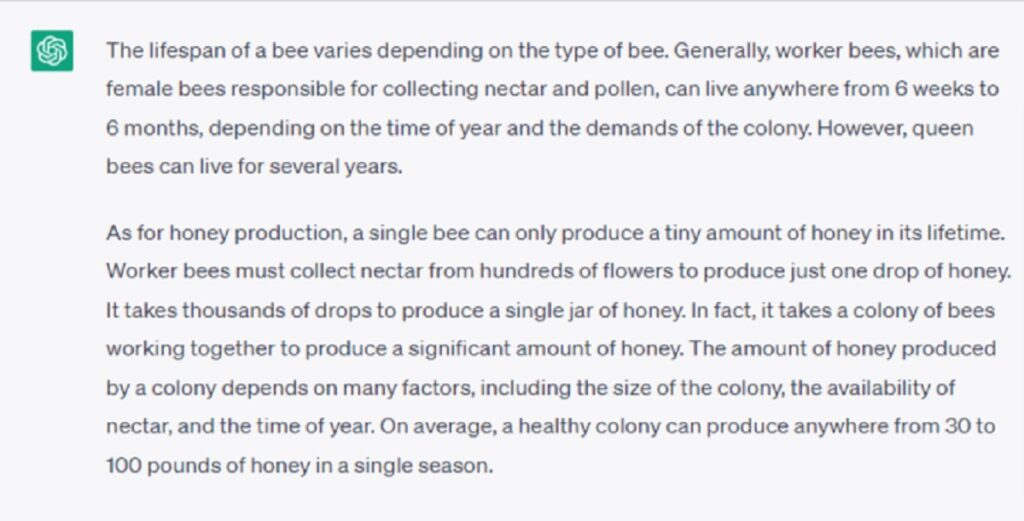
If you have a ChatSonic plan (a revolutionary AI language model like ChatGPT), you can edit, copy, download, and share your conversations with colleagues and followers.
Train ChatGPT To Write In Your Style
Getting ChatGPT to do your work is one thing; getting the AI-generated content written in your style is quite another.
If you are a copywriter who writes content for a fixed target audience, they will be the first to notice if your writing-style changes.
So, you will have to train ChatGPT to write in your style at the start of your assignment.
Here is how to do it:
- Tell ChatGPT you want to train it to write in your style
- Paste an example of your work into the taskbar
- Add extra work for its prep as it gets to analyze your style
- Prompt ChatGPT to use your style to create social media posts, emails, and blog posts
Watch tech expert Jason West’s short YouTube video about how to train ChatGPT to write in your style: Video – How to Train Chat GPT to Write Like You.
An Alternative To Using ChatGPT for Copywriting
Complement your copywriting with Jasper AI!
ChatGPT (free version) and Jasper AI use the large language model GPT 3.5, trained on Reinforcement Learning from Human Feedback (RLHF). While ChatGPT is a powerful generative AI, it is more geared toward research and experimentation.
In contrast, Jasper Chat is specifically designed for business use cases like marketing, sales, and social media posts. It will write website content that better suits business plans by leveraging a combination of models (including OpenAI, T5, Bloom, and Neo X) to generate industry-specific content.
Conclusion: ChatGPT for Copywriting
In conclusion, ChatGPT can be an invaluable tool for a human copywriter.
If you want to streamline your writing processes and unlock your full writing potential, ChatGPT is at your service. From defining your target audience to generating content ideas, creating outlines, and even writing product descriptions or reviews, ChatGPT can provide valuable insights and suggestions.
Remember, while you will save a little time by using ChatGPT for copywriting, you can’t slack off. AI is progressing in leaps and bounds, and you will need to work that much harder to keep up with it.
Yes, AI-powered tools can amplify human creativity, but they can’t replace it. Excellent copywriting requires a deep understanding of human emotions and the ability to connect with your audience on a personal level.
So, while ChatGPT can assist in the AI writing process, it’s ultimately up to you to ensure the final output is engaging, effective, and meets your marketing goals.

![How AEO Will Impact Your Business's Google Visibility in 2026 Why Your Small Business’s Google Visibility in 2026 Depends on AEO [Webinar]](https://articles.entireweb.com/wp-content/uploads/2026/01/How-AEO-Will-Impact-Your-Businesss-Google-Visibility-in-2026-400x240.png)
![How AEO Will Impact Your Business's Google Visibility in 2026 Why Your Small Business’s Google Visibility in 2026 Depends on AEO [Webinar]](https://articles.entireweb.com/wp-content/uploads/2026/01/How-AEO-Will-Impact-Your-Businesss-Google-Visibility-in-2026-80x80.png)















